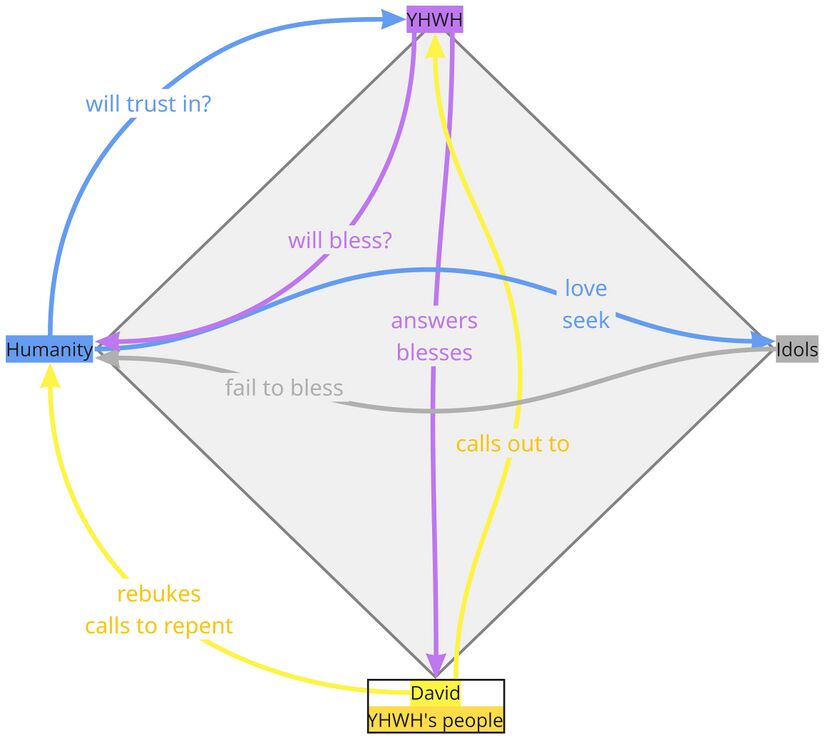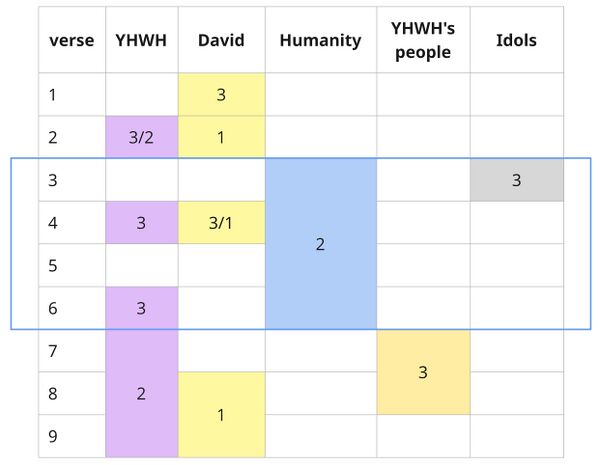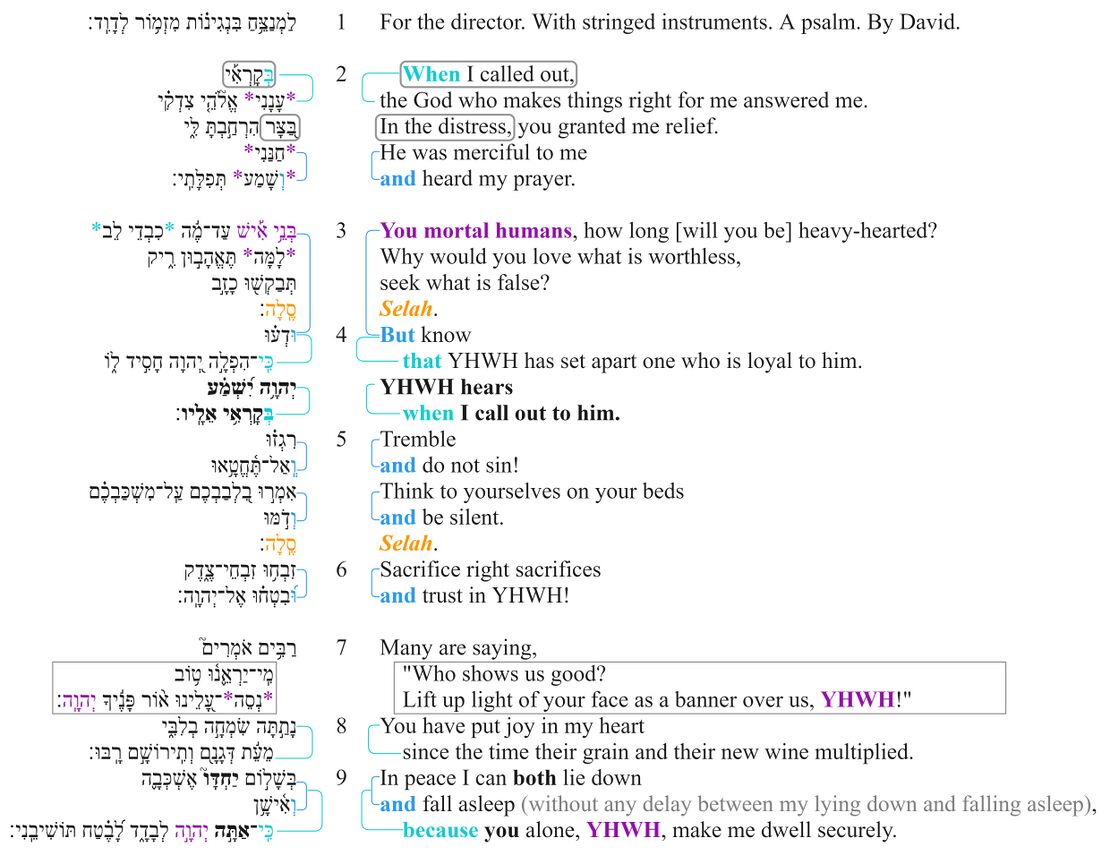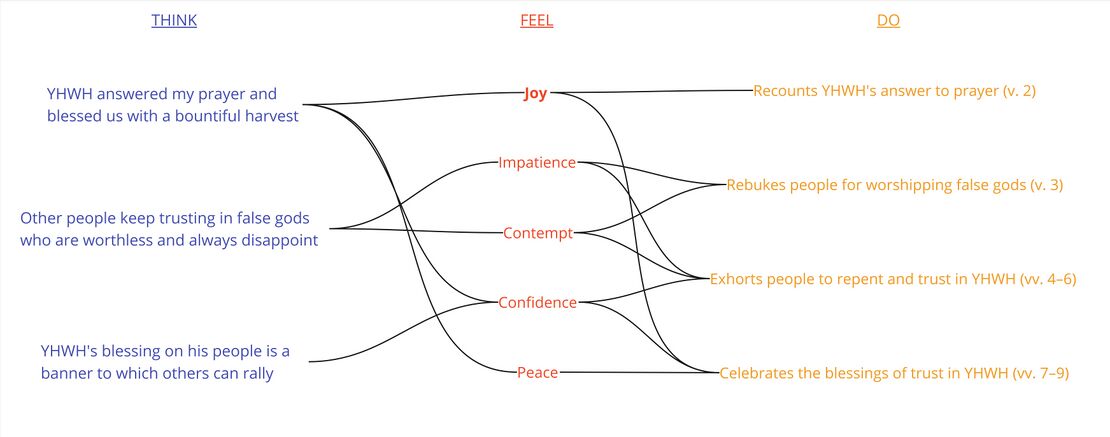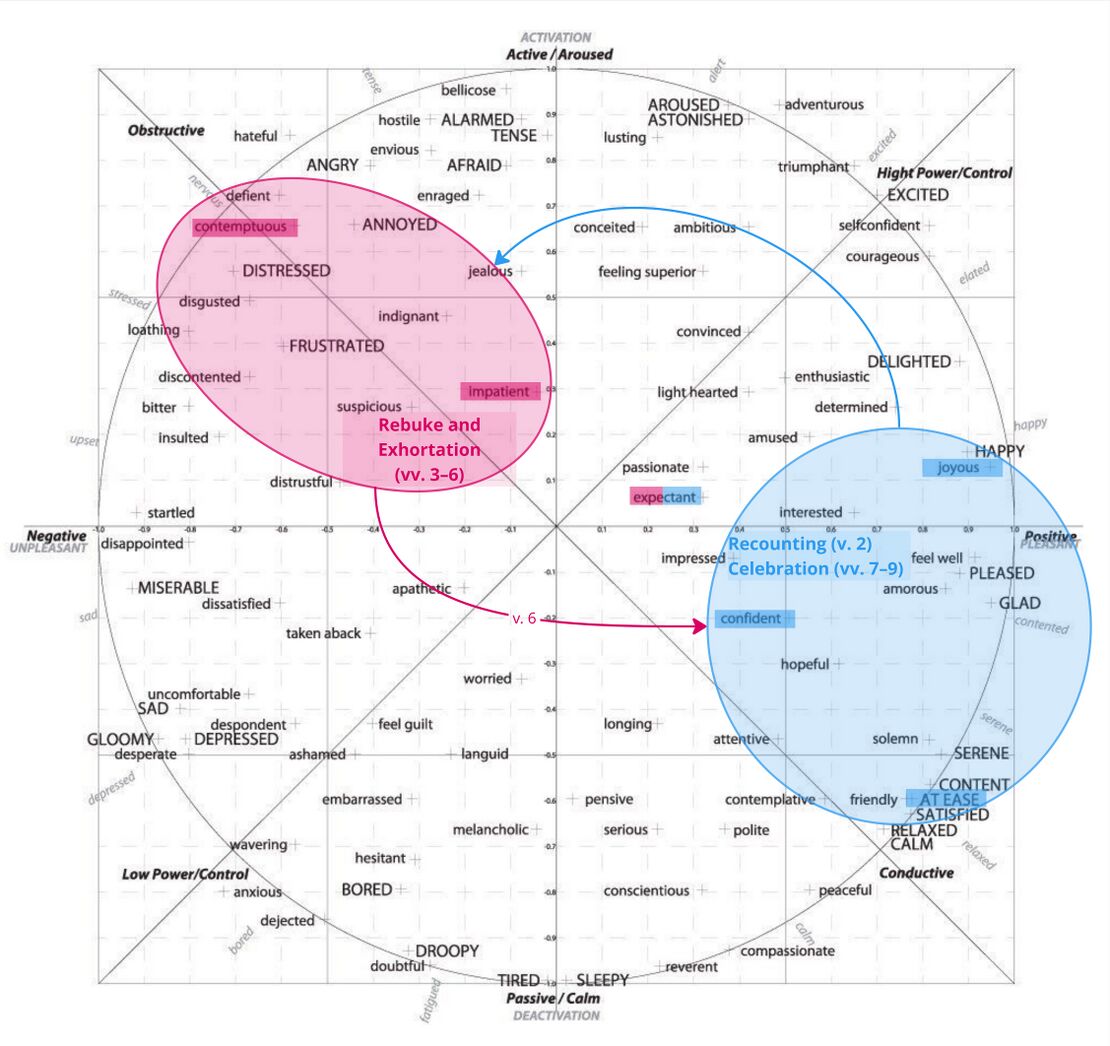Psalm 4 Discourse
About the Discourse Layer
Our Discourse Layer includes four additional layers of analysis:
- Participant analysis
- Macrosyntax
- Speech act analysis
- Emotional analysis
For more information on our method of analysis, click the expandable explanation button at the beginning of each layer.
Participant Analysis
Participant Analysis focuses on the characters in the psalm and asks, “Who are the main participants (or characters) in this psalm, and what are they saying or doing? It is often helpful for understanding literary structure, speaker identification, etc.
For a detailed explanation of our method, see the Participant Analysis Creator Guidelines.
There are 5 participants/characters in Psalm 4:
Profile List
| David |
| "David" (v. 1) |
| "loyal one" (v. 4) |
| YHWH |
| "YHWH" (vv. 4, 6, 7, 9) |
| "God of my prosperity" (v. 2) |
| YHWH's people |
| Humanity |
| "Mortal humans" (v. 3) |
| "many" (v. 7) |
| Idols |
| "Vanity" (v. 3) |
| "Falsehood" (v. 3) |
Profile Notes
- David is the king and representative of YHWH's people. Because he is YHWH's "loyal one" (v. 4), YHWH listens to him when he calls out (vv. 2, 4) and blesses him (vv. 2, 7–9).
- YHWH is "the God who makes things right" for David (v. 2). He has set apart his people and his king for special treatment (v. 4), and so the light of his face is like a banner over them (v. 7), signaling to all people what true blessing looks like and inviting them to participate (cf. vv. 3–6).
- YHWH's people are those who are loyal to him (v. 4) and thus experience his favor and blessing—"the light of his face" manifested in an abundance of grain and new wine (vv. 7–8).
- About half of the psalm is addressed to humanity, referred to as "mortal humans" or "human beings" (v. 3). These are people (whether Israelites or non-Israelites) who seek blessing from gods other than YHWH (vv. 3, 7). David summons them to repent and trust in YHWH for true blessing.
- Lurking in the background of this psalm are idols, or gods that people worship other than YHWH. The psalmist derisively calls these idols "what is vain" and "what is false" (see notes on lexical semantics).
| Hebrew | Verse | English |
|---|---|---|
| לַמְנַצֵּ֥חַ בִּנְגִינ֗וֹת מִזְמ֥וֹר לְדָוִֽד׃ | 1 | For the director. With stringed instruments. A psalm. By David. |
| בְּקָרְאִ֡י עָנָנִי ׀ אֱלֹ֘הֵ֤י צִדְקִ֗י | 2a | When I called out, the God of my prosperity answered me. |
| בַּ֭צָּר הִרְחַ֣בְתָּ לִּ֑י | 2b | In the distress, you granted me relief. |
| חַנַּנִי וְשָׁמַע תְּפִלָּתִֽי׃ | 2c | He was merciful to me and heard my prayer. |
| בְּנֵ֥י אִ֡ישׁ עַד־מֶ֬ה כִבְדֵי לֵב | 3a | Mortal humans, how long [will you be] stubborn? |
| לָמָּה תֶּאֱהָב֣וּן רִ֑יק תְּבַקְשׁ֖וּ כָזָ֣ב סֶֽלָה׃ | 3b | Why would you love vanity, seek falsehood? Selah. |
| וּדְע֗וּ כִּֽי־הִפְלָ֣ה יְ֭הוָה חָסִ֣יד ל֑וֹ | 4a | But knowthat YHWH has set apart one who is loyal to him. |
| יְהוָ֥ה יִ֝שְׁמַ֗ע בְּקָרְאִ֥י אֵלָֽיו׃ | 4b | YHWH hears when I call out to him. |
| רִגְז֗וּ וְֽאַל־תֶּ֫חֱטָ֥אוּ | 5a | Trembleand do not sin! |
| אִמְר֣וּ בִ֭לְבַבְכֶם עַֽל־מִשְׁכַּבְכֶ֗ם וְדֹ֣מּוּ סֶֽלָה׃ | 5b | Think to yourselves on your beds and lament! Selah. |
| זִבְח֥וּ זִבְחֵי־צֶ֑דֶק | 6a | Sacrificeright sacrifices |
| וּ֝בִטְח֗וּ אֶל־יְהוָֽה׃ | 6b | and trust in YHWH! |
| רַבִּ֥ים אֹמְרִים֮ מִֽי־יַרְאֵ֪נ֫וּ ט֥וֹב | 7a | Many are saying,"Who will show us something good? |
| נְסֵה־עָ֭לֵינוּ א֨וֹר פָּנֶ֬יךָ יְהוָֽה׃ | 7b | Cause the light of your face to shine on us, YHWH!" |
| נָתַ֣תָּה שִׂמְחָ֣ה בְלִבִּ֑י | 8a | You have put joy inmy heart |
| מֵעֵ֬ת דְּגָנָ֖ם וְתִֽירוֹשָׁ֣ם רָֽבּוּ׃ | 8b | since the time their grain and their new wine multiplied. |
| בְּשָׁל֣וֹם יַחְדָּו֮ אֶשְׁכְּבָ֪ה וְאִ֫ישָׁ֥ן | 9a | In peace, I can both lie downand fall asleep, |
| כִּֽי־אַתָּ֣ה יְהוָ֣ה לְבָדָ֑ד | 9b | because you alone, YHWH, |
| לָ֝בֶ֗טַח תּוֹשִׁיבֵֽנִי׃ | 9c | make me dwell securely. |
- v. 3: It is possible that YHWH is the speaker of v. 3. The vocative "mortal humans" or "human beings" (בְּנֵי אִישׁ) might imply a divine speaker.
- v. 4: The phrase "one who is loyal to him" refers primarily to David, the king (cf. the "I" in the parallel line), and, through him, to all of YHWH's people—everyone who rejects idolatry (v. 3) and is loyal to him. (The rest of the psalm makes clear that YHWH's people [and not David only] are set apart for special treatment [see vv. 7–8]).
- vv. 7–8: There are multiple participant-related ambiguities in vv. 7–8.
- Who are the "many" in v. 7a? It is possible that the "many" are to be identified with the "mortal humans" addressed in vv. 3–6. The speech of the "many" in v. 7a—"who will show us something good?"—would be entirely consistent with the attitude of the "mortal humans" described in v. 3. As Wilson writes, "This question reveals a rather crass pragmatism that led at the beginning of this psalm [see v. 3] to the callous disregard of covenant obligations and the pursuit of false hopes among the fertility deities."[1] But v. 7b—"the light of your face is made a banner over us, YHWH" or "lift up the light of your face on us, YHWH"—implies trust in YHWH. If v. 7b is part of the speech, then the "many" should be identified with people who trust in YHWH. Thus, the identification of the "many" largely depends on the extent of the speech. If, as we argue, the speech continues through the end of v. 7, then the "many" refer to YHWH's people and the question in v. 7a is rhetorical. It could either express an intense desire for good, a wish,[2] or it could be a liturgical question to which v. 7b gives the response: "Who shows us good? (YHWH does!) The light of your face, YHWH..." (cf. Ps 24:8, 10).
- Who is speaking in v. 7b? Verse 7b is either the psalmist’s own words in response to the "many" (e.g., NIV, NET, CEV, JPS85, NJB, NLT, LUT, NGÜ, TOB, BDS, S21, RVR95, NVI, DHH94I),[3] or a continuation of the speech of the "many" begun in v. 7a (e.g., NRSV, REB, ESV, GNT, HFA, GNB, PDV2017, NFC). The parallelism suggests that v. 7a and v. 7b come from the same speaker. As Goldingay writes, "Both cola refer to ‘we’ and it is natural with NRSV to read the whole verse as referring to the same ‘we’; it is the transition to verse 8 that marks the transition from ‘we’ to ‘I’. Hypothesising a transition to the suppliant’s words within verse 7 works against the poetry."[4] Furthermore, when direct speech is introduced and begun in the a-line of a couplet, it usually continues into the b-line (e.g., Pss 2:7; 10:6, 11; 12:5; 16:2; 38:17; 39:2; 40:8; 41:5; 42:10; 50:16; 53:2?; 55:7; 58:12; 66:3; 68:23; 71:11; 73:11; 77:11; 82:6; 83:5, 13; 87:5; 89:3; 91:2; 94:7; 102:25; 105:11; 139:11; 140:7?; exceptions: Pss 13:5; 14:1?; 27:8; 31:23; 35:10?; 74:8; 79:10; 94:18; 96:10?).
- Whose grain and new wine multiplied (v. 8b)? The suffix "their" in v. 8b naturally refers to YHWH's people, the "many" described in v. 7.
Participant Relations Diagram
The relationships among the participants may be abstracted and summarized as follows:
Macrosyntax
Macrosyntax Diagram
| Macrosyntax legend | |
|---|---|
| Vocatives | Vocatives are indicated by purple text. |
| Discourse marker | Discourse markers (such as כִּי, הִנֵּה, לָכֵן) are indicated by orange text. |
| The scope governed by the discourse marker is indicated by a dashed orange bracket connecting the discourse marker to its scope. | |
| The preceding discourse grounding the discourse marker is indicated by a solid orange bracket encompassing the relevant clauses. | |
| Subordinating conjunction | The subordinating conjunction is indicated by teal text. |
| Subordination is indicated by a solid teal bracket connecting the subordinating conjunction with the clause to which it is subordinate. | |
| Coordinating conjunction | The coordinating conjunction is indicated by blue text. |
| Coordination is indicated by a solid blue line connecting the coordinating clauses. | |
| Coordination without an explicit conjunction is indicated by a dashed blue line connecting the coordinated clauses. | |
| Marked topic is indicated by a black dashed rounded rectangle around the marked words. | |
| The scope of the activated topic is indicated by a black dashed bracket encompassing the relevant clauses. | |
| Marked focus or thetic sentence | Marked focus (if one constituent) or thetic sentences[5] are indicated by bold text. |
| Frame setters[6] are indicated by a solid gray rounded rectangle around the marked words. | |
| [blank line] | Discourse discontinuity is indicated by a blank line. |
| [indentation] | Syntactic subordination is indicated by indentation. |
| Direct speech is indicated by a solid black rectangle surrounding all relevant clauses. | |
| (text to elucidate the meaning of the macrosyntactic structures) | Within the CBC, any text elucidating the meaning of macrosyntax is indicated in gray text inside parentheses. |
If an emendation or revocalization is preferred, that emendation or revocalization will be marked in the Hebrew text of all the visuals.
| Emendations/Revocalizations legend | |
|---|---|
| *Emended text* | Emended text, text in which the consonants differ from the consonants of the Masoretic text, is indicated by blue asterisks on either side of the emendation. |
| *Revocalized text* | Revocalized text, text in which only the vowels differ from the vowels of the Masoretic text, is indicated by purple asterisks on either side of the revocalization. |
- v. 2 / vv. 3–6. The vocative in v. 3a introduces a new unit.
- vv. 3–6 / vv. 7–9. Beginning in v. 7, the psalmist turns again to speak to YHWH (see vocatives in vv. 7, 9; cf. v. 2b).
- v. 2a - Clause- and line-initial בְּקָרְאִי is a frame setter.
- v. 2b - Likewise, בַּצָּר is a frame setter, parallel to בְּקָרְאִי in the previous line/clause. These first two lines (v. 2ab) have an abab structure.
- v. 4b - יְהוָה is fronted to indicate a thetic sentence, with both YHWH and בְּקָרְאִ֥י אֵלָֽיו activated and accessible from the previous discourse.
- v. 8b - The fronting of דְּגָנָם וְתִירוֹשָׁם is poetically motivated; it allows the verb רָבּוּ to conclude the line and form an inclusio with רַבִּים in v. 7a (see Poetic Structure).
- v. 9 - The word order in v. 9 is a-typical in a number of ways.
- The phrase בְּשָׁלוֹם is fronted, probably to create a poetic correspondence with בְּקָרְאִי at the beginning of v. 2 (see Poetic Structure).
- The adverbial יַחְדָּו is pre-verbal (contrast, e.g., Isa 46:2; Ps 35:26), perhaps for marked focus: I will both lie down and fall asleep, i.e., these two actions will happen simultaneously: I will fall asleep as soon as I lie down.
- The pronoun "you" (אַתָּה) is fronted for exclusive focus: "you (and you alone)." The adjectival phrase "alone" (לְבָדָד) further clarifies the exclusivity of YHWH's agency.
- The adverbial phrase לָבֶטַח is fronted, perhaps to correspond to the word order in v. 6b or perhaps to allow the verb תּוֹשִׁיבֵנִי to occur at the end of the clause/line/poem. Delaying the verb תּוֹשִׁיבֵנִי until the last word of this long clause creates tension that resolves with a strong sense of closure once the verb is finally read/heard.[7] As the last word of v. 9, תּוֹשִׁיבֵנִי also forms an inclusio with the first word of the verse, בְּשָׁלוֹם (notice the similar sounds b + sh), thus strengthening the sense of closure.
- vv. 3, 5 - Selah (vv. 3, 5) does not indicate strong discourse boundaries in this psalm, as it does, for example, in the previous psalm (Ps 3). It does, however subdivide the second main section of the psalm, the address to mortal humans, into three parts (see Poetic Structure).
There are no notes on conjunctions for this psalm.
Speech Act Analysis
The Speech Act layer presents the text in terms of what it does, following the findings of Speech Act Theory. It builds on the recognition that there is more to communication than the exchange of propositions. Speech act analysis is particularly important when communicating cross-culturally, and lack of understanding can lead to serious misunderstandings, since the ways languages and cultures perform speech acts varies widely.
For a detailed explanation of our method, see the Speech Act Analysis Creator Guidelines.
Summary Visual
| Speaker | Verses | Macro Speech Acts | Addressee | |||||
|---|---|---|---|---|---|---|---|---|
| David | v. 1 For the director. With stringed instruments. A psalm. By David. | Superscription (v. 1) | YHWH | |||||
| v. 2 When I called out, the God who makes things right for me answered me. In the distress, you granted me relief. He was merciful to me and heard my prayer. | Recounting (v. 2) |
|||||||
| YHWH, you answered me and gave relief! | ||||||||
| v. 3 Mortal humans, how long [will you be] heavy-hearted? Why would you love what is worthless, seek what is false? Selah. | Rebuke (v. 3) |
People | ||||||
| How long will you people stubbornly worship false gods? | ||||||||
| v. 4 But know that YHWH has set apart one who is loyal to him. YHWH hears when I call out to him. | Exhortation (vv. 4–6) |
|||||||
| v. 5 Tremble and do not sin! Think to yourselves on your beds and be silent! Selah. | Repent and trust in YHWH! | |||||||
| v. 6 Sacrifice right sacrifices and trust in YHWH! | Supporting statement (v. 4) See how YHWH blesses those who trust in him! |
|||||||
| v. 7 Many are saying, "Who shows us good? Lift up the light of your face as a banner over us, YHWH!" | Celebration (vv. 7-9) |
YHWH | ||||||
| v. 8 You have put joy in my heart since the time their grain and their new wine multiplied. | Others are looking for a god to bless them. YHWH, you have blessed us and made us an example to others! | |||||||
| v. 9 In peace, I can both lie down and fall asleep, because you alone, YHWH, make me dwell securely. | ||||||||
Speech Act Analysis Chart
The following chart is scrollable (left/right; up/down).
| Verse | Hebrew | CBC | Sentence type | Illocution (general) | Illocution with context | Macro speech act | Intended perlocution (Think) | Intended perlocution (Feel) | Intended perlocution (Do) |
| Verse number and poetic line | Hebrew text | English translation | Declarative, Imperative, or Interrogative Indirect Speech Act: Mismatch between sentence type and illocution type |
Assertive, Directive, Expressive, Commissive, or Declaratory Indirect Speech Act: Mismatch between sentence type and illocution type |
More specific illocution type with paraphrased context | Illocutionary intent (i.e. communicative purpose) of larger sections of discourse These align with the "Speech Act Summary" headings |
What the speaker intends for the address to think | What the speaker intends for the address to feel | What the speaker intends for the address to do |
If an emendation or revocalization is preferred, that emendation or revocalization will be marked in the Hebrew text of all the visuals.
| Emendations/Revocalizations legend | |
|---|---|
| *Emended text* | Emended text, text in which the consonants differ from the consonants of the Masoretic text, is indicated by blue asterisks on either side of the emendation. |
| *Revocalized text* | Revocalized text, text in which only the vowels differ from the vowels of the Masoretic text, is indicated by purple asterisks on either side of the revocalization. |
| Verse | Text (Hebrew) | Text (CBC) | Sentence type | Illocution (general) | Illocution with context | Macro speech act | Intended perlocution (Think) | Intended perlocution (Feel) | Intended perlocution (Do) | Speech Act Notes |
|---|---|---|---|---|---|---|---|---|---|---|
| 1 | לַמְנַצֵּ֥חַ בִּנְגִינ֗וֹת מִזְמ֥וֹר לְדָוִֽד׃ | For the director. With stringed instruments. A psalm. By David. | Fragments | Assertive | Giving information about the author, genre, and performance of this psalm | |||||
| 2 | בְּקָרְאִ֡י *עָנָנִי* ׀ אֱלֹ֘הֵ֤י צִדְקִ֗י | When I called out, the God who makes things right for me answered me. | Declarative | Assertive | Recounting how YHWH answered him when he called out | Recounting YHWH's answer to prayer | Others will realize how YHWH answered the psalmist and gave him relief | Others will share in the psalmist's joy and thankfulness to YHWH | Others will call out to YHWH when they are in distress | |
| 2a | בַּ֭צָּר הִרְחַ֣בְתָּ לִּ֑י | In the distress, you granted me relief. | Declarative | Assertive | Recounting how YHWH gave him relief in the distress | |||||
| 2b | *חַנַּנִי* | He was merciful to me | Declarative | Assertive | Recounting how YHWH was merciful to him | |||||
| 2c | *וְשָׁמַע* תְּפִלָּתִֽי׃ | and heard my prayer. | Declarative | Assertive | Recounting how YHWH heard his prayer | |||||
| 3 | בְּנֵ֥י אִ֡ישׁ עַד־מֶ֬ה *כִבְדֵי לֵב* | Mortal humans, how long [will you be] heavy-hearted? | Interrogative | Expressive | Expressing impatience towards people who persist in worshipping false gods | Rebuking people for worshipping false gods | People will realize that other gods are worthless and that it's the people of YHWH who are truly blessed, that YHWH has set apart his people for special treatment | People will be ashamed of trusting in false and worthless gods | People will turn from false gods and trust in YHWH | • Interrogative "how long" (עַד מֶה) is a rhetorical question, implying the speaker's judgment that the situation has lasted long enough and that the addressee should stop doing what he is doing (see e.g., Exod 10:3) |
| 3a | *לָמָּה* תֶּאֱהָב֣וּן רִ֑יק | Why would you love what is worthless, | Interrogative | Expressive | Expressing contempt towards worthless gods and those who worship them | • BDB: למה "with an impf., often deprecating, or introducing rhetorically, the reason why something should, or should not, be done, why should …?"• "Vanity" belongs to the lexical domain of "Fail" and the contextual domain of "Success and Failure," and "shame" is an emotion closely associated with failure (see SDBH: "to be ashamed [because one has failed]"). By describing the object of the people's love as "vanity," he wants to inspire in them feelings of shame. | ||||
| 3b | תְּבַקְשׁ֖וּ כָזָ֣ב סֶֽלָה׃ | seek what is false? Selah. | Interrogative | Expressive | Expressing contempt towards false gods and those who worship them | |||||
| 4 | וּדְע֗וּ כִּֽי־הִפְלָ֣ה יְ֭הוָה חָסִ֣יד ל֑וֹ | But know that YHWH has set apart one who is loyal to him. | Imperative | Directive | Exhorting people to recognize YHWH's special treatment of his people | Exhorting people to repent and trust in YHWH | People will be afraid when they realize that they have been rejecting YHWH, the true God | |||
| 4a | יְהוָ֥ה יִ֝שְׁמַ֗ע בְּקָרְאִ֥י אֵלָֽיו׃ | YHWH hears when I call out to him. | Declarative | Assertive | Describing the special relationship that he has with YHWH | |||||
| 5 | רִגְז֗וּ | Tremble | Imperative | Directive | Exhorting people to tremble in fear | "Trembling" implies fear (see e.g., Exod 15:14 [with חיל]; Deut 2:25 [with פחד, ירא and חיל]; etc.) | ||||
| 5a | וְֽאַל־תֶּ֫חֱטָ֥אוּ | and do not sin! | Imperative | Directive | Exhorting people to stop sinning | |||||
| 5b | אִמְר֣וּ בִ֭לְבַבְכֶם עַֽל־מִשְׁכַּבְכֶ֗ם | Think to yourselves on your beds | Imperative | Directive | Exhorting people to stop wailing on their beds to foreign gods and, instead, to reflect quietly to themselves | |||||
| 5c | וְדֹ֣מּוּ סֶֽלָה׃ | and be silent! Selah. | Imperative | Directive | Exhorting people to stop wailing on their beds to foreign gods and, instead, to reflect quietly to themselves | |||||
| 6 | זִבְח֥וּ זִבְחֵי־צֶ֑דֶק | Sacrifice right sacrifices | Imperative | Directive | Exhorting people to offer right sacrifices | People will have confidence in YHWH and in his ability and willingness to bless them if they turn to him | ||||
| 6a | וּ֝בִטְח֗וּ אֶל־יְהוָֽה׃ | and trust in YHWH! | Imperative | Directive | Exhorting people to trust in YHWH | |||||
| 7 | רַבִּ֥ים אֹמְרִים֮ מִֽי־יַרְאֵ֪נ֫וּ ט֥וֹב | Many are saying, "Who shows us good? | Declarative• "Interrogative" | Assertive• "Directive" | Describing the celebration of the many who trust in YHWH• "Asking (liturgically) who shows them good, who is the source of their blessing." | Celebrating the blessings of trust in YHWH | Others will see how YHWH has blessed his people | Others will share in the psalmist's joy and thankfulness for YHWH's special blessings on them | Others will celebrate YHWH's special blessing on his people and trust in YHWH | • The "who" (מִי) question might be expressing a sincere, wholesome desire for YHWH to bless them with good (so Briggs 1906, 31; Waltke 2010, 158; on the use of מי to express a wish, cf. GKC §151a). But elsewhere, מי appears to be used to express "an unreal wish" (HALOT), implying doubt about the fulfillment of the wish. E.g., Num 11:4—מִ֥י יַאֲכִלֵ֖נוּ בָּשָֽׂר. It makes more sense, then, to interpret the מִי as indicating a real question (albeit a liturgical question to which the speaker knows the answer) instead of indicating a wish. |
| 7a | *נְסֵה*־עָ֭לֵינוּ א֨וֹר פָּנֶ֬יךָ יְהוָֽה׃ | Lift up the light of your face as a banner over us, YHWH!" | • "Declarative | • "Assertive" | • "Answering the question "Who shows us good?" by calling on YHWH for blessing, portraying YHWH's blessing on them as a "banner" that identifies them and shows the way for others to find good." | |||||
| 8 | נָתַ֣תָּה שִׂמְחָ֣ה בְלִבִּ֑י מֵעֵ֬ת דְּגָנָ֖ם וְתִֽירוֹשָׁ֣ם רָֽבּוּ׃ | You have put joy in my heart since the time their grain and their new wine multiplied. | Declarative | Assertive | Describing how YHWH has filled him with joy by (answering his prayer and) giving Israel an abundant harvest | |||||
| 8a | ||||||||||
| 9 | בְּשָׁל֣וֹם יַחְדָּו֮ אֶשְׁכְּבָ֪ה וְאִ֫ישָׁ֥ן | In peace, I can both lie down and fall asleep, | Declarative | Assertive | Describing his peaceful state, how he can fall asleep as soon as he lies down | |||||
| 9a | כִּֽי־אַתָּ֣ה יְהוָ֣ה לְבָדָ֑ד לָ֝בֶ֗טַח תּוֹשִׁיבֵֽנִי׃ | because you alone, YHWH, make me dwell securely. | Declarative | Assertive | Attributing his state of peace and security to YHWH (and YHWH alone) |
Emotional Analysis
This layer explores the emotional dimension of the biblical text and seeks to uncover the clues within the text itself that are part of the communicative intent of its author. The goal of this analysis is to chart the basic emotional tone and/or progression of the psalm.
For a detailed explanation of our method, see the Emotional Analysis Creator Guidelines.
Emotional Analysis Chart
If an emendation or revocalization is preferred, that emendation or revocalization will be marked in the Hebrew text of all the visuals.
| Emendations/Revocalizations legend | |
|---|---|
| *Emended text* | Emended text, text in which the consonants differ from the consonants of the Masoretic text, is indicated by blue asterisks on either side of the emendation. |
| *Revocalized text* | Revocalized text, text in which only the vowels differ from the vowels of the Masoretic text, is indicated by purple asterisks on either side of the revocalization. |
| Verse | Text (Hebrew) | Text (CBC) | The Psalmist Feels | Emotional Analysis Notes |
|---|---|---|---|---|
| 1 | לַמְנַצֵּ֥חַ בִּנְגִינ֗וֹת מִזְמ֥וֹר לְדָוִֽד׃ | For the director. With stringed instruments. A psalm. By David. | ||
| 2 | בְּקָרְאִ֡י *עָנָנִי* ׀ אֱלֹ֘הֵ֤י צִדְקִ֗י | When I called out, the God who makes things right for me answered me. | Joy that YHWH has heard him and made things right for him; Relief at no longer being in distress. |
The "joy" in vv. 7–9 (see emotional note on v. 8) is implicit in v. 2, where the psalmist recounts how YHWH answered his prayer for a bountiful harvest (cf. v. 8). |
| 2a | בַּ֭צָּר הִרְחַ֣בְתָּ לִּ֑י | In the distress, you granted me relief. | ||
| 2b | *חַנַּנִי* | He was merciful to me | ||
| 2c | *וְשָׁמַע* תְּפִלָּתִֽי׃ | and heard my prayer. | ||
| 3 | בְּנֵ֥י אִ֡ישׁ עַד־מֶ֬ה *כִבְדֵי לֵב* | Mortal humans, how long [will you be] heavy-hearted? | Impatience at the stubbornness of people who worship idols Contempt towards those who love vanity. Expectation that those who used to worship idols will offer right sacrifices and trust in YHWH (v. 6) |
See Speech act notes |
| 3a | *לָמָּה* תֶּאֱהָב֣וּן רִ֑יק | Why would you love what is worthless, | ||
| 3b | תְּבַקְשׁ֖וּ כָזָ֣ב סֶֽלָה׃ | seek what is false? Selah. | ||
| 4 | וּדְע֗וּ כִּֽי־הִפְלָ֣ה יְ֭הוָה חָסִ֣יד ל֑וֹ | But know that YHWH has set apart one who is loyal to him. | ||
| 4a | יְהוָ֥ה יִ֝שְׁמַ֗ע בְּקָרְאִ֥י אֵלָֽיו׃ | YHWH hears when I call out to him. | ||
| 5 | רִגְז֗וּ | Tremble | ||
| 5a | וְֽאַל־תֶּ֫חֱטָ֥אוּ | and do not sin! | ||
| 5b | אִמְר֣וּ בִ֭לְבַבְכֶם עַֽל־מִשְׁכַּבְכֶ֗ם | Think to yourselves on your beds | ||
| 5c | וְדֹ֣מּוּ סֶֽלָה׃ | and be silent! Selah. | ||
| 6 | זִבְח֥וּ זִבְחֵי־צֶ֑דֶק | Sacrifice right sacrifices | Verse 6 seems to assume a more positive tone than vv. 3–5. There are no more markers of impatience ("how long...?") or contempt ("why would...?") or any negative commands ("stop sinning!"). Instead, the exhortations in v. 6 are positive: sacrifice right sacrifices and trust in YHWH. The words "right" and "trust," furthermore, are associated with positive feelings (see vv. 2a, 9c). | |
| 6a | וּ֝בִטְח֗וּ אֶל־יְהוָֽה׃ | and trust in YHWH! | ||
| 7 | רַבִּ֥ים אֹמְרִים֮ מִֽי־יַרְאֵ֪נ֫וּ ט֥וֹב | Many are saying, "Who shows us good? | Joy from YHWH's abundant provision; Confidence in YHWH's provision and protection; Peace because YHWH makes him secure. | |
| 7a | *נְסֵה*־עָ֭לֵינוּ א֨וֹר פָּנֶ֬יךָ יְהוָֽה׃ | Lift up the light of your face as a banner over us, YHWH!" | ||
| 8 | נָתַ֣תָּה שִׂמְחָ֣ה בְלִבִּ֑י מֵעֵ֬ת דְּגָנָ֖ם וְתִֽירוֹשָׁ֣ם רָֽבּוּ׃ | You have put joy in my heart since the time their grain and their new wine multiplied. | In v. 8, the psalmist explicitly describes his emotional state with the word "joy" (שִׂמְחָה). "Joy expresses itself in frisking about (Jer 50:11), clapping (Ezek 25:6), dancing, shouting, and singing. One of the most popular places of joy is the festival" (TDOT). | |
| 8a | ||||
| 9 | בְּשָׁל֣וֹם יַחְדָּו֮ אֶשְׁכְּבָ֪ה וְאִ֫ישָׁ֥ן | In peace, I can both lie down and fall asleep, | Peace: "condition in which there is no conflict, war, danger, sickness, famine, or anything to fear, but where one can live at ease and with confidence" (SDBH) | |
| 9a | כִּֽי־אַתָּ֣ה יְהוָ֣ה לְבָדָ֑ד לָ֝בֶ֗טַח תּוֹשִׁיבֵֽנִי׃ | because you alone, YHWH, make me dwell securely. |
Affective Circumplex
Bibliography
- Baethgen, Friedrich. 1904. Die Psalmen. Göttingen: Vandenhoeck und Ruprecht.
- Barré, Michael L. 1995. “Hearts, Beds, and Repentance in Psalm 4,5 and Hosea 7,14.” Biblica 76 (1): 53–62.
- Barthélemy, Dominique. 2005. Critique Textuelle de l’Ancien Testament. Vol. Tome 4: Psaumes. Fribourg, Switzerland: Academic Press.
- Bons, Eberhard. 2011. “Psalmoi / Das Buch Der Psalmen.” In Septuaginta Deutsch: Erläuterungen und Kommentare zum griechischen Alten Testament, edited by Martin Karrer and Wolfgang Kraus. Vol. 2. Stuttgart: Deutsche Bibelgesellschaft.
- Briggs, Charles A., and Emilie Briggs. 1906. A Critical and Exegetical Commentary on the Book of Psalms. Vol. 1. ICC. Edinburgh: T & T Clark.
- Brown, William P. 2002. Seeing the Psalms: A Theology of Metaphor. Louisville, KY: Westminster John Knox Press.
- Buttenwieser, Moses. 1938. The Psalms: Chronologically Treated with a New Translation. University of Chicago Press.
- Craigie, Peter C. 1983. Psalms 1–50. WBC 19. Waco, TX: Word.
- Cook, John A. 2024. The Biblical Hebrew Verb: A Linguistic Introduction. Learning Biblical Hebrew. Grand Rapids: Baker Academic.
- Dahood, Mitchell. 1963. “Hebrew-Ugaritic Lexicography I.” Biblica 44 (3): 289–303.
- Dahood, Mitchell. 1966. Psalms. Vol. 1. Anchor Bible Commentary. New York: Doubleday.
- Driver, G. R. 1942. “Notes on the Psalms. I. 1—72.” The Journal of Theological Studies 43 (171/172): 149–60.
- Duhm, Bernhard. 1899. Die Psalmen. Mohr Siebeck.
- Eaton, John. 1975. Kingship and the Psalms. Studies in Biblical Theology, 2d ser., 32. London: S.C.M. Press.
- Fokkelman, J. P. 2000. Major Poems of the Hebrew Bible: At the Interface of Hermeneutics and Structural Analysis. Studia Semitica Neerlandica. Assen, The Netherlands: Van Gorcum.
- Garrett, Duane A. 1997. Hosea, Joel. The New American Commentary 19A. Nashville: Broadman & Holman.
- Geller, Stephen. 2018. “The ‘Precative Perfect’ in Psalms and the Struggle for Faith.” In The Unfolding of Your Words Gives Light: Studies on Biblical Hebrew in Honor of George L. Klein, edited by Ethan C. Jones. University Park, Pennsylvania: Eisenbrauns.
- Gentry, Peter J. 1998. “The System of the Finite Verb in Classical Hebrew.” Hebrew Studies 39:7–39.
- Gesenius, W. Donner, H. Rüterswörden, U. Renz, J. Meyer, R. (eds.). 2013. Hebräisches und aramäisches Handwörterbuch über das Alte Testament. Berlin: Springer.
- Goldingay, John. 2006. “Psalm 4: Ambiguity and Resolution.” Tyndale Bulletin 57 (2): 161–72.
- Grosser, Emmylou. 2023. Unparalleled Poetry: A Cognitive Approach to the Free-Rhythm Verse of the Hebrew Bible. Cognition and Poetics. New York: Oxford University Press.
- Gunkel, Hermann. 1926. Die Psalmen. 4th ed. Göttinger Handkommentar zum Alten Testament 2. Göttingen: Vandenhoeck & Ruprecht.
- Hossfeld, Frank-Lothar, and Erich Zenger. 1993. Die Psalmen I: Psalm 1–50. Neue Echter Bibel. Würzburg: Echter.
- Ibn Ezra. Ibn Ezra on Psalms.
- Jacobson, Rolf A., et al. 2014. The Book of Psalms. NICOT. Grand Rapids, MI: Eerdmans.
- John Chrysostom. 1998. St. John Chrysostom Commentary on the Psalms. Translated by Robert C. Hill. Brookline, MA: Holy Cross Orthodox Press.
- Kennicott, Benjamin. 1776. Vetus testamentum hebraicum : cum variis lectionibus.
- Kim, Young Bok. 2023. Hebrew Forms of Address: A Sociolinguistic Analysis. Atlanta: SBL Press.
- Kselman, John. 1987. “A Note on Psalm 4:5.” Biblica 68 (1): 103–5.
- Lagarde, Paul de. 1886. “Novae Psalterii Graeci editionis specimen.” In Abhandlungen der Königlichen Gesellschaft der Wissenschaften zu Göttingen. Göttingen: In der Dieterischen Buchhandlung.
- Malbim. Malbim on Psalms.
- Mannati, M. 1970. “Sur Le Sens de Min En Ps IV 8.” Vetus Testamentum 20 (3): 361–66.
- Moshe Yitzhak Ashkenazi. Ho'il Moshe.
- Olmo Lete, Gregorio del, and Joaquín Sanmartín. 2004. A Dictionary of the Ugaritic Language in the Alphabetic Tradition. Leiden ; Boston: Brill.
- Pietersma, Albert. 2021. “Psalm 4 A Commentary on the Text–as–Produced.”
- Pritchard, James Bennett. 1969. Ancient Near Eastern Texts Relating to the Old Testament with Supplement. Third edition. Princeton: Princeton University Press.
- Radak. Radak on Psalms.
- Rashi. Rashi on Psalms.
- Reyburn, William David. 1992. A Handbook on Lamentations. UBS Helps for Translators. New York: United Bible Societies.
- Robar, Elizabeth. 2020. “Ethan C. Jones (Ed.), The Unfolding of Your Words Gives Light: Studies on Biblical Hebrew in Honor of George L. Klein.” Journal of Semitic Studies 65 (2): 633–39.
- Ryken, Leland, et al., eds. 1998. Dictionary of Biblical Imagery. Downers Grove, Ill: InterVarsity Press.
- Spieckermann, Hermann. 2023. Psalmen. 1: Psalm 1 - 49. Das Alte Testament Deutsch, 14,1. Göttingen: Vandenhoeck & Ruprecht.
- Staszak, Martin. 2024. The Preposition Min. Beiträge zur Wissenschaft vom Alten und Neuen Testament (BWANT) 246. Stuttgart: Kohlhammer.
- Taylor, Richard A. 2020. The Psalms According to the Syriac Peshitta Version with English Translation. Piscataway: Gorgias Press.
- Waltke, Bruce K., J. M. Houston, and Erika Moore. 2010. The Psalms as Christian Worship: A Historical Commentary. Grand Rapids, MI: William B. Eerdmans Pub. Co.
- Weber, Beat. 2016. Werkbuch Psalmen. 1: Die Psalmen 1 bis 72, zweite, aktualisierte Auflage. Stuttgart: Verlag W. Kohlhammer.
- Weiser, Artur. 1962. The Psalms: A Commentary. Philadelphia: Westminster Press.
- Wilson, Gerald H. 2002. Psalms. Vol. 1. NIVAC. Grand Rapids: Zondervan.
- Zenger, Erich. 1990. “‘Gib mir Antwort, Gott meiner Gerechtigkeit’ (Ps 4,2): Zur Theologie des 4. Psalms.” In Die Alttestamentliche Botschaft als Wegweisung, edited by Josef Zmijewski, 377–403. FS H. Reinelt: Stuttgart.
Footnotes
- ↑ Wilson 2002, 158.
- ↑ So Briggs 1906, 31; Waltke 2010, 158.
- ↑ Cf. Baethgen 1904, 10.
- ↑ So Goldingay 2006, 167; cf. Waltke 2010, 238.
- ↑ When the entire utterance is new/unexpected, it is a thetic sentence (often called "sentence focus"). See our Creator Guidelines for more information on topic and focus.
- ↑ Frame setters are any orientational constituent – typically, but not limited to, spatio-temporal adverbials – function to "limit the applicability of the main predication to a certain restricted domain" and "indicate the general type of information that can be given" in the clause nucleus (Krifka & Musan 2012: 31-32). In previous scholarship, they have been referred to as contextualizing constituents (see, e.g., Buth (1994), “Contextualizing Constituents as Topic, Non-Sequential Background and Dramatic Pause: Hebrew and Aramaic evidence,” in E. Engberg-Pedersen, L. Falster Jakobsen and L. Schack Rasmussen (eds.) Function and expression in Functional Grammar. Berlin: Mouton de Gruyter, 215-231; Buth (2023), “Functional Grammar and the Pragmatics of Information Structure for Biblical Languages,” in W. A. Ross & E. Robar (eds.) Linguistic Theory and the Biblical Text. Cambridge: Open Book Publishers, 67-116), but this has been conflated with the function of topic. In brief: sentence topics, belonging to the clause nucleus, are the entity or event about which the clause provides a new predication; frame setters do not belong in the clause nucleus and rather provide a contextual orientation by which to understand the following clause.
- ↑ On the use of word order "to affect the strength of grammatical closure at the end of the line," see Grosser 2023, 212.
- ↑ Kim 2022, 213-217.
- ↑ Cf. Miller 2010, 357.

